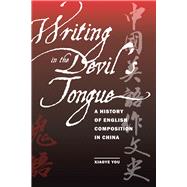
Xiaoye You, an assistant professor of English at Penn State University, is a coeditor of The Politics of Second Language Writing: In Search of the Promised Land. He has published articles in CCC, Rhetoric Review, Rhetoric Society Quarterly, World Englishes, and Journal of Second Language Writing.
| Preface | p. xi |
| Introduction | p. 1 |
| Encountering The Devil's Writing, 1862-1918 | p. 14 |
| Tong Wen Guan | p. 15 |
| Writing in Traditional Chinese Education | p. 18 |
| The Infiltration of Western Rhetoric | p. 27 |
| American Influences in English Composition | p. 30 |
| New Sensibilities in the Devil's Tongue | p. 40 |
| Writing and Decolonization, 1919-49 | p. 46 |
| The New Culture Movement | p. 47 |
| Conflation of Rhetorical Traditions | p. 49 |
| Translation and English Writing | p. 59 |
| Public Speaking and Extracurricular Writing | p. 62 |
| Writing in a Gendered Voice | p. 66 |
| Writing as Anti-Imperialist Warfare | p. 70 |
| Localizing English Composition Pedagogy | p. 72 |
| Writing and The Proletarian Revolution 1950-76 | p. 78 |
| The Decline of English Teaching | p. 79 |
| Old Practices and New Influences | p. 81 |
| Structural Linguistics and Writing | p. 84 |
| Chinese Proletarian Rhetoric | p. 87 |
| Writing in the Party Spirit | p. 92 |
| Writing in "Bastardized" English | p. 97 |
| English Pedagogy for Proletarian Revolution | p. 100 |
| Writing and The Four Modernizations, 1977-90 | p. 105 |
| The Return of Anglo-American Teachers | p. 106 |
| The Marxist Style of Writing | p. 109 |
| Redefining English Composition | p. 114 |
| Teaching Writing to English Majors | p. 118 |
| Intensive Reading and Writing | p. 122 |
| Socialist Undertones in Student Writing | p. 128 |
| The Revival of English Writing Research | p. 132 |
| Writing and Socialism with Chinese Characteristics, 1991-2008 | p. 136 |
| Education for a Market Economy | p. 137 |
| Creativity and Individuality in Chinese Composition | p. 139 |
| The College English Test | p. 144 |
| The "Five-Legged Essay" Paradigm | p. 149 |
| The Free Spirit of Student Writing | p. 156 |
| Writing Research with Chinese Characteristics | p. 162 |
| Writing in our Tongue | p. 167 |
| Redesigning English Literacy | p. 167 |
| A History of Writing in "Our" Tongue | p. 171 |
| Globalization and Composition Studies | p. 175 |
| A Sketch of Rhetoric and English Composition Courses at Mission colleges, 1900-1950 | p. 183 |
| Sample Corrected Student Essays at Ginling College, 1923 | p. 193 |
| Notes | p. 197 |
| Works Cited | p. 209 |
| Index | p. 231 |
| Table of Contents provided by Ingram. All Rights Reserved. |
The New copy of this book will include any supplemental materials advertised. Please check the title of the book to determine if it should include any access cards, study guides, lab manuals, CDs, etc.
The Used, Rental and eBook copies of this book are not guaranteed to include any supplemental materials. Typically, only the book itself is included. This is true even if the title states it includes any access cards, study guides, lab manuals, CDs, etc.